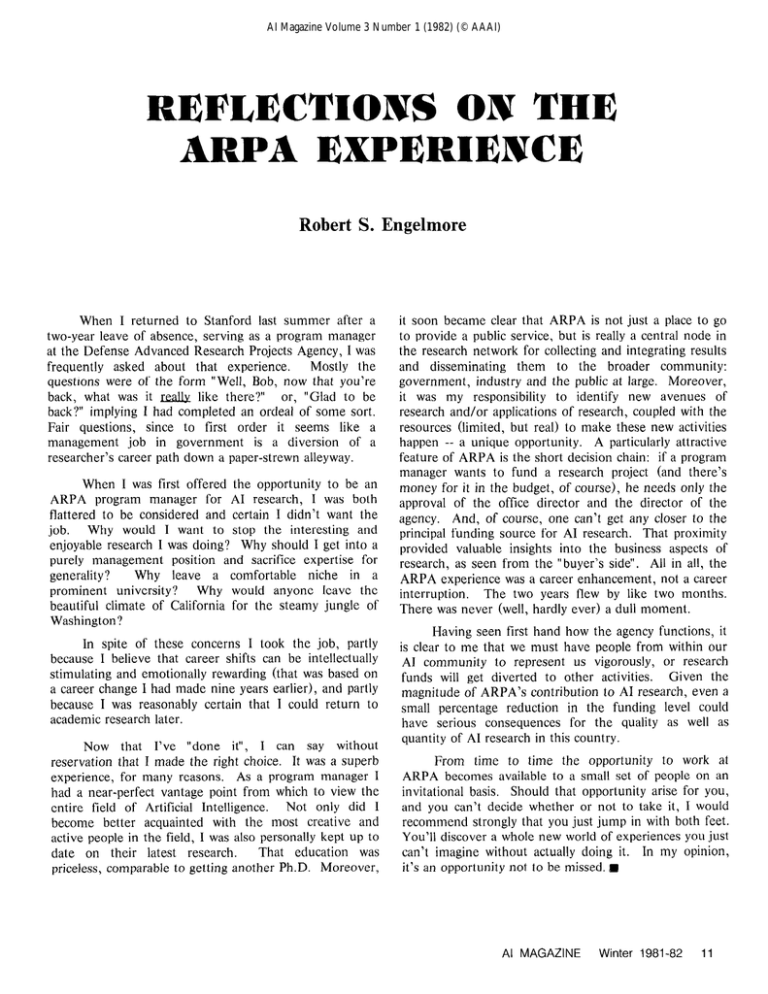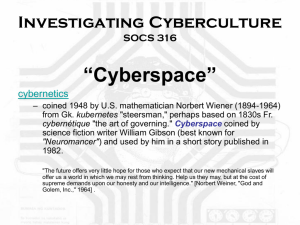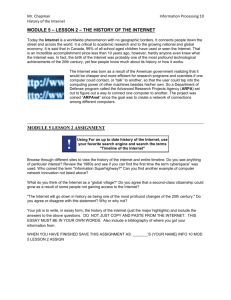REFLECTIONS ON THE ARPA EXPERIENCE Robert S. Engelmore
advertisement

AI Magazine Volume 3 Number 1 (1982) (© AAAI) REFLECTIONS ON THE ARPA EXPERIENCE Robert S. Engelmore When I returned to Stanford last summer after a two-year leave of absence, serving as a program manager at the Defense Advanced Research Projects Agency, I was Mostly the frequently asked about that experience. questions were of the form “Well, Bob, now that you’re back, what was it EL& like there?” or, “Glad to be back?” implying I had completed an ordeal of some sort. Fair questions, since to first order it seems like a management job in government is a diversion of a researcher’s career path down a paper-strewn alleyway. When I was first offered the opportunity to be an ARPA program manager for AI research, I was both flattered to be considered and certain I didn’t want the job. Why would I want to stop the interesting and enjoyable research I was doing? Why should I get into a purely management position and sacrifice expertise for generality? Why leave a comfortable niche in a prominent university? Why would anyone leave the beautiful climate of California for the steamy jungle of Washington? In spite of these concerns I took the job, partly because I believe that career shifts can be intellectually stimulating and emotionally rewarding (that was based on a career change I had made nine years earlier), and partly because I was reasonably certain that I could return to academic research later. Now that I’ve “done it”, I can say without reservation that I made the right choice. It was a superb experience, for many reasons. As a program manager I had a near-perfect vantage point from which to view the Not only did I entire field of Artificial Intelligence. become better acquainted with the most creative and active people in the field, I was also personally kept up to That education was date on their latest research. priceless, comparable to getting another Ph.D. Moreover, it soon became clear that ARPA is not just a place to go to provide a public service, but is really a central node in the research network for collecting and integrating results and disseminating them to the broader community: government, industry and the public at large. Moreover, it was my responsibility to identify new avenues of research and/or applications of research, coupled with the resources (limited, but real) to make these new activities happen -- a unique opportunity. A particularly attractive feature of ARPA is the short decision chain: if a program manager wants to fund a research project (and there’s money for it in the budget, of course), he needs only the approval of the office director and the director of the agency. And, of course, one can’t get any closer to the principal funding source for AI research. That proximity provided valuable insights into the business aspects of research, as seen from the “buyer’s side”. All in all, the ARPA experience was a career enhancement, not a career interruption. The two years flew by like two months. There was never (well, hardly ever) a dull moment. Having seen first hand how the agency functions, it is clear to me that we must have people from within our AI community to represent us vigorously, or research funds will get diverted to other activities. Given the magnitude of ARPA’s contribution to AI research, even a small percentage reduction in the funding level could have serious consequences for the quality as well as quantity of AI research in this country. From time to time the opportunity to work at ARPA becomes available to a small set of people on an invitational basis. Should that opportunity arise for you, and you can’t decide whether or not to take it, I would recommend strongly that you just jump in with both feet. You’ll discover a whole new world of experiences you just can’t imagine without actually doing it. In my opinion, it’s an opportunity not to be missed. E Al MAGAZINE Winter 1981-82 11







